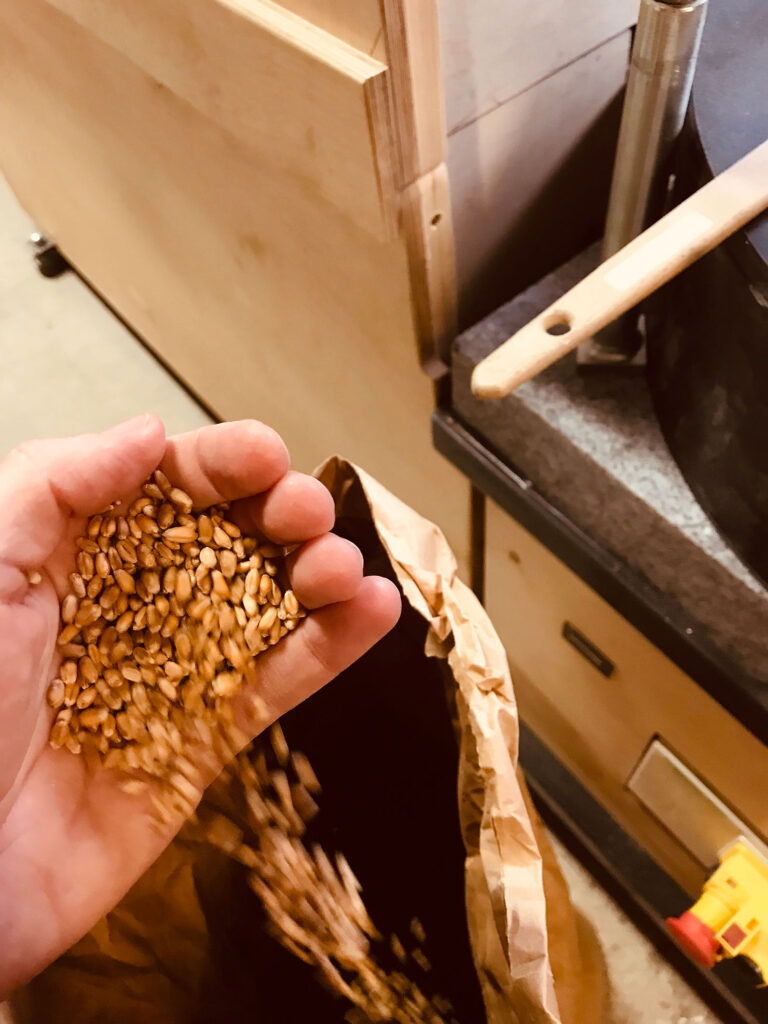Flour mills: key advantages
Optimise your production
With an agricultural flour mill, you’re taking on a whole new area of your business. By choosing to create your own flour from your own farm produce, you can optimise your business by becoming totally independent.

From growing the seeds to processing the grain into quality flour, you control the entire production chain. As a farmer-baker, choosing to produce your own flour also means freeing yourself from the constraints that bind you to certain suppliers.
Often, the farmer-baker is bound hand and foot to his flour supplier. The supplier gives him financial assistance to set up, as costs in this sector are particularly high. In exchange, all the flour has to be bought from the supplier, and it’s difficult to regain your independence in this context. By taking over the milling business, you gain your autonomy by regaining total control!
Recapturing the hearts of consumers with the farm flour mill
By choosing a quality agricultural flour mill, you can gradually rebuild a bond of trust with consumers. And the least we can say is that this link between farmers and consumers has been weakened by the arrival of the agri-food industry and supermarkets.
As a cereal grower, you don’t really know what happens to your production. How is your flour processed? Is it used to make products that reflect your values? Products that take care of consumers’ health?
Unfortunately, your flour is often used as an ingredient in ultra-processed products that are difficult to digest, and sometimes work in symbiosis with numerous harmful additives.
So by taking back control of how your flour is processed and used, you rebuild the link between the terroir and the end consumer. Better still, you ARE the direct link between the terroir and the end consumer!
And the result is sure to be a hit with consumers, who are happy to be able to find products that meet their requirements in terms of quality and taste!
Create your own flour to sell at your point of sale
To achieve total autonomy, cereal growers and bakers are not doing things by halves. By choosing a unique, high-quality agricultural flour mill, they have also decided to become independent when it comes to selling products made from their milling.

To stand out from the crowd, selling direct from the farm or on the farm is ideal.
Set up a milling workshop for greater profitability
When you set up a milling facility on your farm, it’s profitability that’s really at stake. Here’s a little simulation to show you how much margin you can make by setting up a milling facility on your farm.
By analysing the cost of wheat (based on yield, production costs and quantity of wheat) and processing costs (electricity, packaging, marketing costs), you can achieve an attractive return: investing in a flour mill is the key to achieving autonomy, even financial autonomy!
Find a high-performance flour mill
Taking stock of your requirements
To choose your agricultural flour mill, you first need to take stock of what you want and what you need. There are a number of questions you need to ask yourself if you want to get a clear picture and establish a strategy that will be profitable for your business:
- What yield do I need? Here, everything depends on the costs and size of your operation. You’ll need to carry out a financial analysis to determine how much flour you’ll need to produce, how much bread/pastry/pasta/cakes you’ll need to make, and at what price you’ll need to offer them in order to be both profitable and affordable for the consumer. The team you buy your flour mill from will be able to help you with all the financial aspects and provide solid budgetary support (more on that later!).
- What will my differentiation strategy be? Here, you need to think about the marketing strategies you need to follow to develop your business. To stand out from your (mainly industrial) competitors, you can differentiate yourself on quality and taste. The strategy of low prices is the one pursued by supermarkets by limiting the quality of ingredients, and it’s also the one that consumers shun! So, to enhance the quality and taste of your products, the idea is to grow new, nutritious cereals (rye, buckwheat, spelt, flax, barley, chestnuts, wheat, maize, etc.) and process them into wholemeal or semi-complete flour, so that it retains all its nutrients.
Should I opt for a stone wheel?
Among the most common mills on the market are stone mills. A number of studies have shown the importance, from a nutritional point of view, of a milling process that preserves every part of the grain, including the germ. However, with most agricultural flour mills, when the grain is transformed into flour, it is completely oxidised, losing the germ and therefore all its protein content.



